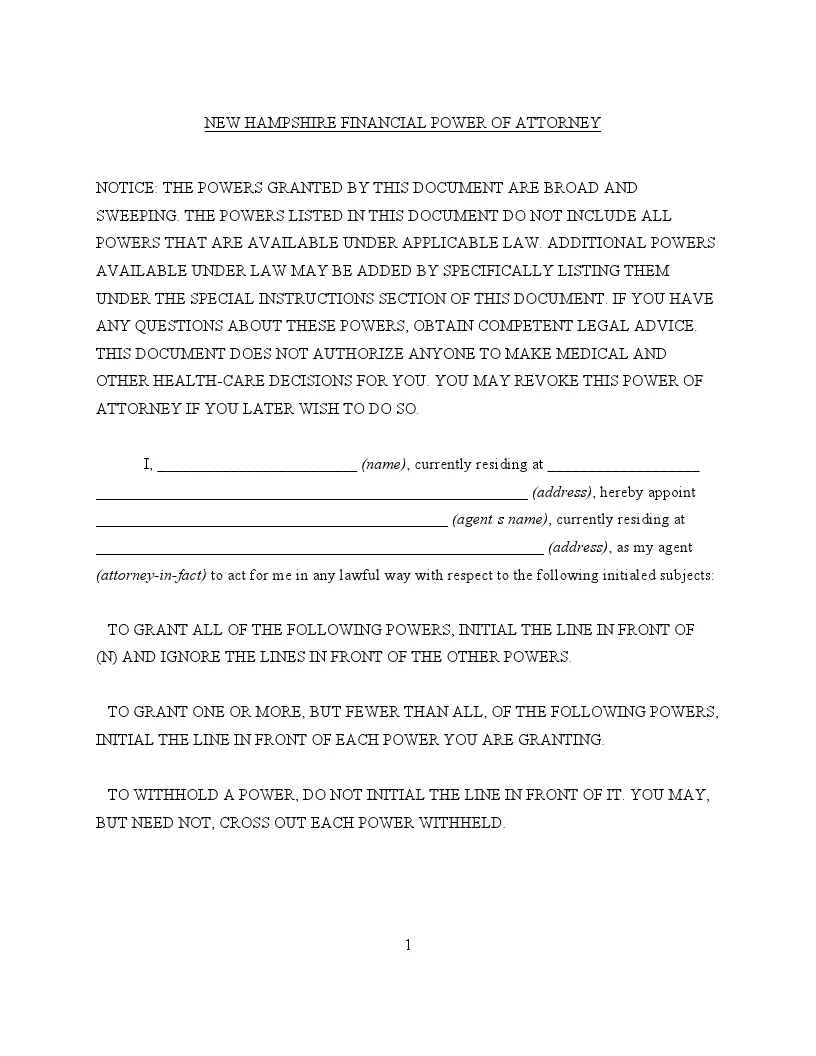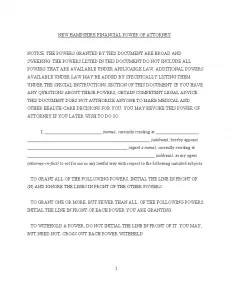New Hampshire General Financial Power of Attorney Form
The New Hampshire general financial power of attorney form enables a person to appoint an agent — such as a friend, family member, or qualified professional — to oversee their financial affairs. The agent will have the authority to handle financial decisions as outlined in the form. However, this authority will cease if the person granting it becomes incapacitated.
Unlike a limited option, a general power of attorney grants the agent broad powers to handle various financial activities. These include overseeing bank accounts, purchasing or selling real estate, submitting tax returns, and managing investment transactions. Agents granted power of attorney must always act in the principal’s best interest, maintain precise records, keep the principal’s assets separate, and avoid conflicts of interest.
Completing New Hampshire POA forms is crucial to protecting your decisions if you cannot make them yourself.

Build Your Document
Answer a few simple questions to make your document in minutes
Save and Print
Save progress and finish on any device, download and print anytime
Sign and Use
Your valid, lawyer-approved document is ready
In New Hampshire, the laws governing a general power of attorney are encapsulated within the Uniform Power of Attorney Act, specifically Sections 564-E:101 to 564-E:403. This legal framework allows an individual, designated as the agent, to perform a wide range of actions that the principal could normally do themselves, as detailed in Sections 564-E:204 to 564-E:216. Key actions an agent can undertake only with explicit authority include:
- Creating, amending, revoking, or terminating an inter vivos trust.
- Making gifts with restrictions to prevent jeopardizing the principal’s financial security.
- Modifying rights of survivorship and beneficiary designations.
- Delegating powers granted under the power of attorney.
- Waiving rights to annuities or retirement plan benefits.
- Exercising any fiduciary powers, the principal can delegate.
- Managing the content of the principal’s electronic communications.
To make all powers official, the state requires that all power of attorney documents be notarized as per Section 564-E:105. Additionally, the principal retains the right to revoke a power of attorney as outlined in Section 564-E:110, ensuring they maintain ultimate control over their affairs as long as they are capable.
New Hampshire General Power of Attorney Form Details
| Document Name | New Hampshire General Power of Attorney Form |
| Other Name | New Hampshire Financial Power of Attorney |
| Relevant Laws | New Hampshire Statutes, Sections 564-E:101 to 564-E:403 |
| Avg. Time to Fill Out | 10 minutes |
| # of Fillable Fields | 41 |
| Available Formats | Adobe PDF |
Filling Out New Hampshire General (Financial) POA Form
Filling out the New Hampshire general power of attorney form requires attention to ensure all your interests are protected. Here’s a step-by-step guide on how to complete the form.
1. Understand the Document
Before you begin, read the entire form to understand the scope of powers you are granting. This document allows your designated agent to perform various activities on your behalf.
2. Fill Out the Principal and Agent Information
Enter your full name and address as the principal, then specify the full name and address of the person you are appointing as your agent (attorney-in-fact).
3. Specify Powers Granted
You need to initial beside each power you wish to grant to your agent. The powers include, but are not limited to:
- Banking powers. Managing bank transactions.
- Real and personal property transactions. Handling the buying, selling, and managing of real and personal property.
- Gift making. Authority to make gifts under certain conditions.
- Tax matters. Handling of tax payments and filings.
Ensure you understand each category before granting authority by initialing beside the corresponding descriptions.
4. Sign and Date the Document
Once you finish filling out the powers, sign and date the document while in the presence of a notary public. Your agent must also sign and agree to the assigned responsibilities.
5. Notarization
Take the document to a notary public to have it notarized. The notary will confirm your identity and understanding of the document’s significance.
6. Distribute Copies
Provide a copy to your agent and any financial institutions or other entities that may require it. Keep the original in a safe place.
7. Revocation and Amendments
Remember, you can revoke or amend this power of attorney anytime. To do this, you must complete a new document and re-notarize it.
